“This is a forgotten place,” Marcos says, as he unlocks the chain wrapped tight around a set of big blue doors.
“But you’re with me. You’re probably safer up here than you are down in Medellin.”
Eight years of living in the Colombian city, and Marcos knows what he’s talking about. “Up here” is Regalo de Dios, a small barrio in the mountains overlooking Medellin, and their community is clearly enamoured with this New York native.
It’s with good reason, too: Marcos Kaseman started out teaching English, voluntarily, at a local school, and ended up running a type of community centre in a building rented from the head of the local paramilitary, who just finished up his latest prison sentence two weeks ago.
Before he started his six year sentence, he threatened to kill Marcos. On my second day with Angeles de Medellin, that same ex-prisoner came to fix the leaking roof.
Stories like these begin, thick and fast, from the moment I shake Marcos’s hand at the entrance to the infamous Medellin cable cars at 10am. Every morning, he meets the day’s volunteers at the metro station, because Medellin’s favelas are renowned for their danger, and heading in alone is thus not for the faint of heart.
Luckily, Marcos knows so many of the people here, and holds such a good reputation that he could well be right. If you’re with him, no harm is going to come to you.
A gringo angel living in Colombia
When we walk through Regalo de Dios, children run towards us as they spy Marcos. Women wave, men smile; he bumps fists with the guys on the bus, with the men driving trucks, and with the local police walking through the town.
“I think it’s because I’m a teacher,” he says. “When you become a teacher you’re respected, and accepted into the community.”
He’s watched innumerable people in the area grow up – “they’re like my family,” he says, happily. But why has Marcos decided to make Regalo de Dios his new home?
Simple. It’s the location of Angeles de Medellin.
I first heard about the Angeles when I was researching volunteer projects in South America. My friend and fellow blogger, Adam, had written glowing reviews of his experience with the Angeles , and when I told him I was planning to travel through Colombia at some point, the response was unequivocal.
“You have to go to Medellin. And you have to meet Marcos and the Angeles.”
And as it turns out, Adam was completely right.
Angeles de Medellin: an introduction
For the last six years, Marcos has been running a community centre where children can come to play in a safe environment, and adults can come to learn English. It might sound pretty simple, but it’s actually far from it.
The centre is located in Regalo de Dios, a small barrio that is filled to the brim with families displaced by the violence of Medellin – and the politicians just don’t care. The barrio is governed by the next door city of Baju, and any spare money intended for these people is always immediately diverted to some other cause. Twice, the uneven dirt road leading up the barrio has almost been fixed, until the funds have mysteriously vanished.
So Marcos, one lone American expat with a heart bigger than Medellin and a stern resolve to help, is pretty much this community’s only hope for any chance of change.
The major bump in Regalo de Dios’s road is that the favelas overlooking Medellin are still fraught with danger. Buses are routinely stopped by gang members demanding a payoff in return for safe passage, and from time to time, people just go missing.
As we walk around the area close to the centre Marcos advises us to stay close to him, so it’s obvious we’re his cohorts – and on seeing our cameras, he stresses that we should never take photos of men in Colombia, anywhere, at any time.
“They could be in gangs, and they won’t want their picture taken. They’ll almost certainly take your camera, and maybe more.”
He doesn’t expand. He doesn’t have to. As we look out across the city, I can feel the eyes of a group of boys boring into the back of my neck. It’s not threatening at all; but I know they’re wary. What is a group of foreigners doing up here, anyway?
Actually, I was there to play Twister. And Jenga. And revisit my childhood with a table full of Lego pieces, giant jigsaw puzzles, and tubs of overworked Play-Doh.
Because Marcos is well aware that these kids ultimately need to still be kids, despite the difficult and tenuous situation of their upbringing.
So me and the other volunteers spend our afternoons playing, repeatedly, with a room filled with boisterous, energetic children, all of whom love the idea that they can laugh at our less-than-perfect Spanish, tease a South Korean volunteer about his Gangnam Style dance moves and request to be swung around by a 6 foot 3 American football player.
“This is why we’re here”
There’s an extremely sad aspect to this otherwise wonderful volunteer project, however. While English classes were in progress, I got talking to a local policeman who wasn’t improving his language skills that day, as his wife was due to give birth any minute.
He was clearly already good with kids; a young boy had his arms entwined around the policeman’s waist as we chatted about the plight of the community.
“This boy?” he said, as I asked where his family was. “The mother left, when the children were 8, 5 and 3 years. I don’t know where she went. Now only the father is with them.”
So many children, so few parents. It’s sadly quite a common trait, particularly when there’s a situation that simply proves too difficult to handle.
On my second day, two women arrived at the centre with a baby named Kevin. His fingers and toes are fused together, and he has a range of health problems which were apparently too much for his mother, who abandoned him to the care of his aunts.
When they came to see Marcos, he jumped straight into action. Searching through bags for packs of nappies and clothes, he handed them money for baby food, and immediately got on the phone to a contact at the children’s hospital in Medellin, who agreed to take on Kevin’s surgeries. No doubt there’ll be a lot of them.
But this is what Marcos is fostering; a network of charitable contacts and generous people the world over, who are willing to help care for a community who otherwise have nothing.
The Angeles de Medellin Foundation: a work in progress
His ultimate goal is to start a foundation, where young unwed mothers can work in some kind of production, effectively getting them out of their houses and learning family values at the same time. He also wants to start a dental program – because “when you have barely any money, do you buy food or do you buy a toothbrush?”
But more importantly, a foundation will enable him to share some of the responsibility, as Angeles de Medellin grows in size and in awareness.
A clever move on Marcos’s part is his invitation for anyone to come and volunteer with Angeles de Medellin, even if it’s just for one morning. As a result, he recieves a range of volunteers from all over the world, brought together by one common factor: the desire to help.
In my two days with the Angeles, there were fourteen different volunteers, hailing from five different countries. All of us had the same impression: that this place was truly special, and deserved at least a bit of our time.
And with every new volunteer that visits, the stories start spreading. Three people from my hostel decided to visit the Angeles because of my description of the place – and I get the impression this is just the start.
Stripping back the veil in Medellin
Volunteering with Angeles de Medellin is also an incredible eye opener to the dark side of Colombia; something that many travellers don’t take completely seriously now. When there are hostels and tourist-friendly bars, it’s easy to disregard the warnings, but then you’re sitting on a bus in the mountains and Marcus turns to speak to you.
“See this guy, sitting on the bus with us?”
Head partly shaved, close to the skull; a bleached blonde mohawk strip with streaks of dark brown showing through; a slight smudge of white cream on the high cheekbone. I can’t see his face properly – it’s obscured by dark sunglasses and the collar of his jacket is turned up, covering his neck.
“This guy is the head of the cartel up in the mountains. He collects payment from every bus and every shop, every single day. That cartel are basically the legacy of Escobar’s group – he’s in charge of the area. A few months back, I was walking with some friends and saw him stabbing someone, in broad daylight. I don’t know if he survived; we kept our heads down and didn’t look.”
So there I was, sat on the same bus as a gang leader, possible murderer, definite criminal. Someone with no qualms about attacking people.
The journey back to Medellin was a sobering reminder that, although Marcos has the best of intentions and the purest of hearts, the dangers of Regalo de Dios are indeed very real.
Why are Marcos and the Angeles so special?
Marcos had never met a foreign woman in Medellin until 2008: a city where an estimated fifteen hundred people died this year. His radical lifestyle change has placed him in an extremely dangerous community – and it’s all by choice.
Nobody told him to come to Regalo de Dios; no voluntary organisation, no social project, no friends, no relatives. Marcos found this place himself and, spurred on by nothing more than a driving passion to help, he designated himself the people’s helper.
This passion ends up being transferred to the children he looks after, who clearly love the centre and Marcos. And that same passion affects every volunteer who finds themselves at Angeles de Medellin. Once they’ve moved on to other cities and countries, it seems as if the place sticks in the memory; which is why Marcos often receives donations like new computers or giant TVs.
Not many of us know what desperation is in our lives. Not really. Most people I know have dealt with a particularly awful situation at some point, but to be honest? The kids up in Regalo de Dios have been through hell and back before they even reach double figures – and their smiles don’t even betray the fact.
Marcos is one of the most inspiring people I’ve met in a long time, but I have to contest his theory somewhat. Regalo de Dios may be a forgotten place, but it’s constantly gathering interest from people who care about its welfare.
And hopefully, if enough of us talk about how special the Angeles de Medellin are, the dangers for these kids will eventually decrease. After all, they’ve got people the world over supporting them.

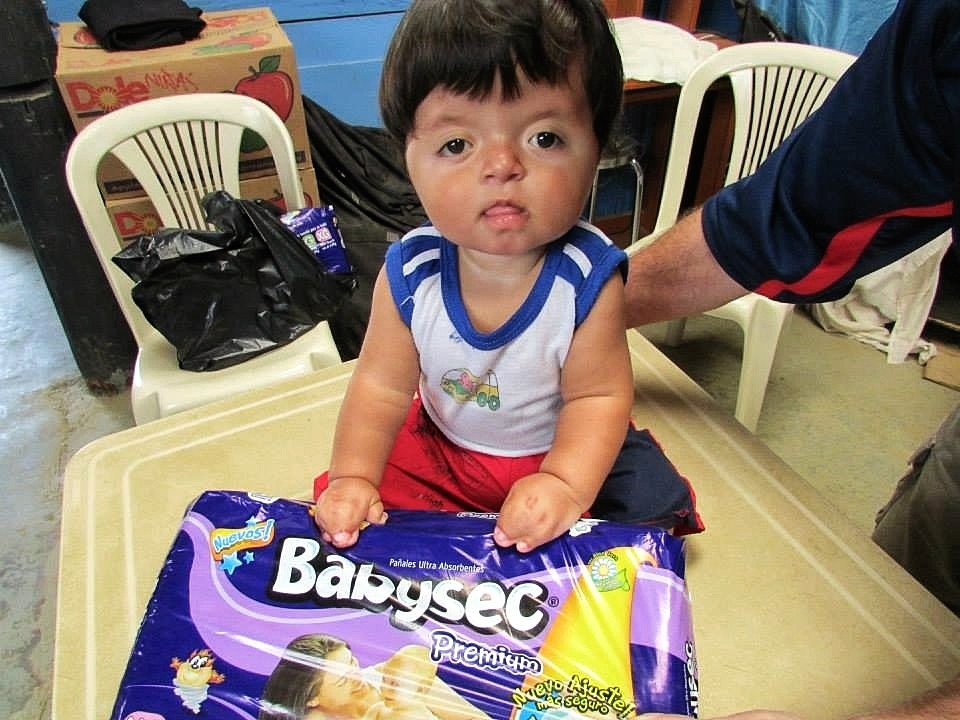
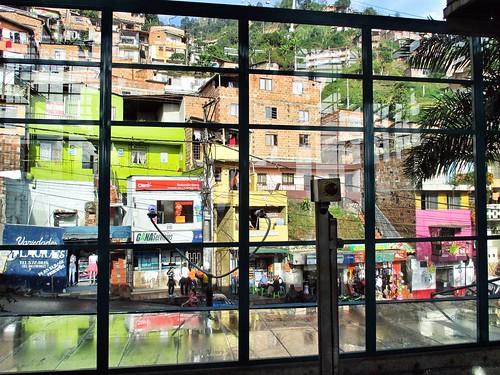
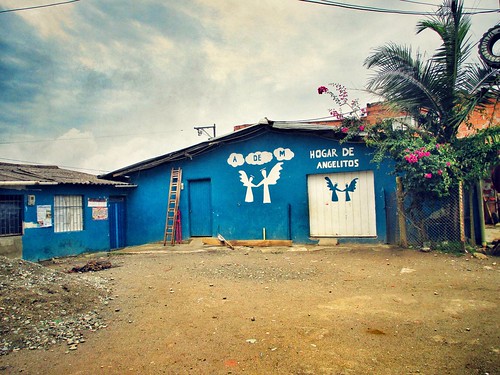
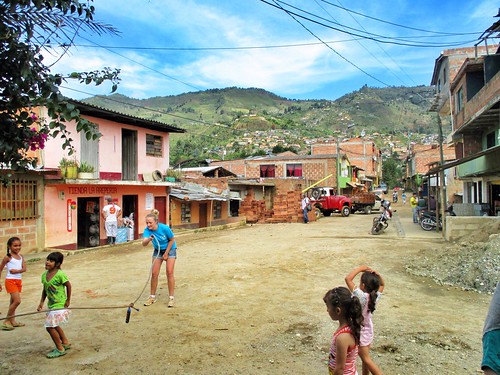
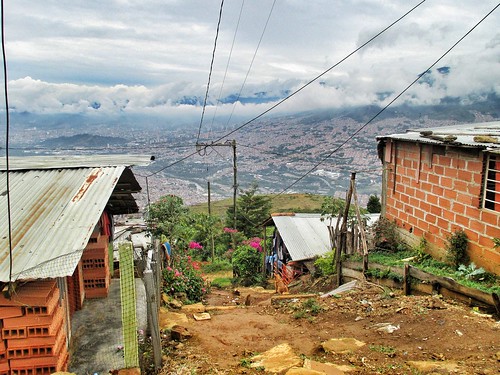
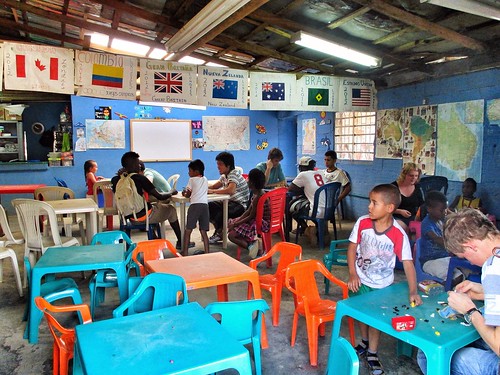
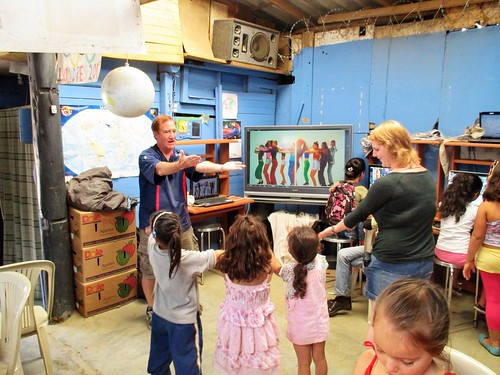
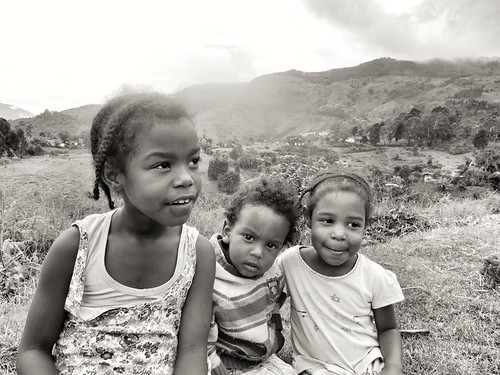
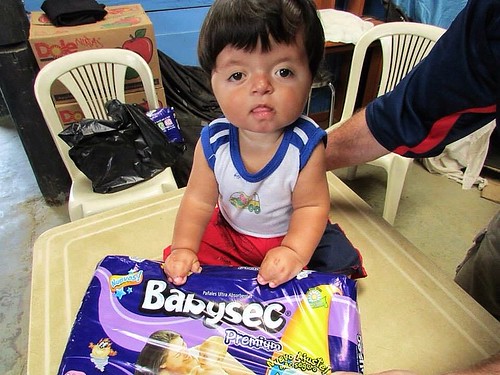
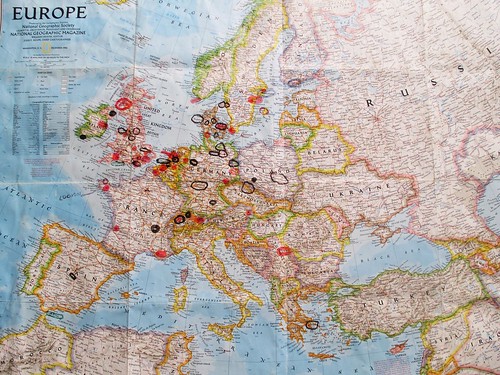

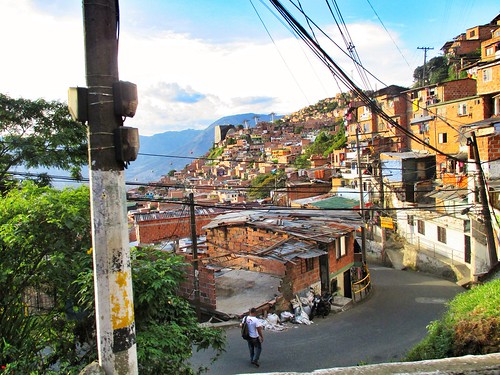
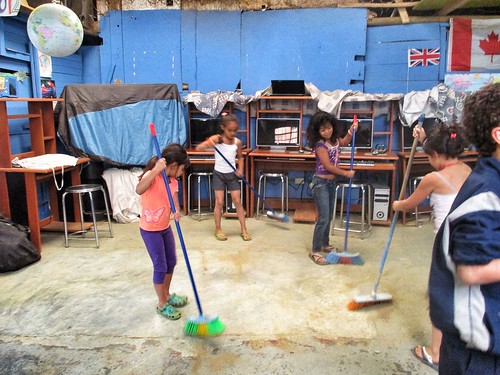
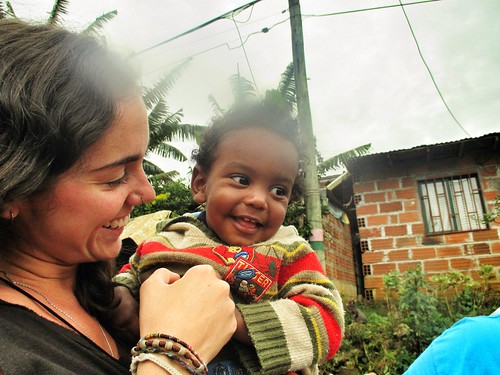
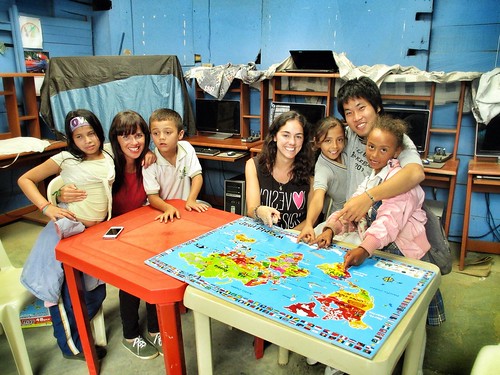
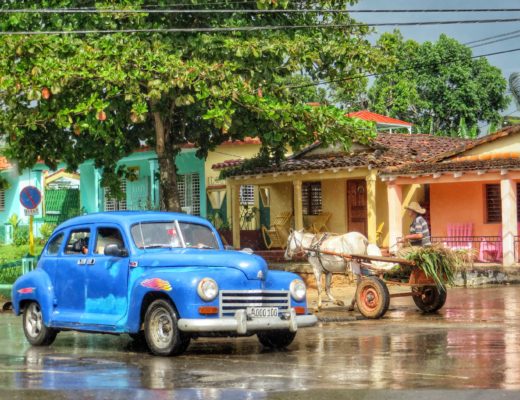
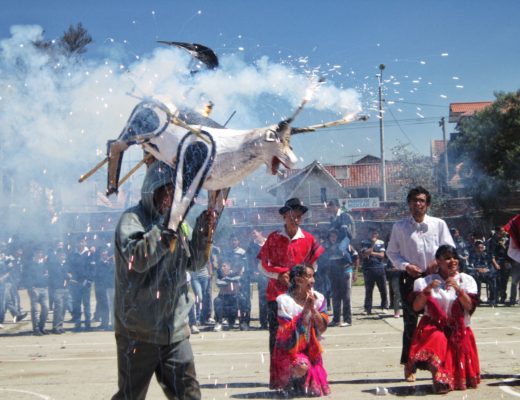
15 Comments
Adam Pervez
August 30, 2013 at 9:31 amI’m so glad you got to visit the angels and meet Marcos. I knew it would be an amazing experience and I’m so happy you’ve spread the word here about the work Marcos is doing. 🙂
Flora
September 6, 2013 at 1:24 pmYou said it would be amazing, and you were right! Thanks again, Adam, for telling me about the Angeles and Marcos 🙂
Kadie
August 30, 2013 at 11:31 amThis is so sweet, sad, and hopeful. Thank you for introducing me to such an amazing organization!
Flora
September 6, 2013 at 1:24 pmYou’re more than welcome, Kadie 🙂
Aoife
September 1, 2013 at 7:59 pmSo beautiful! I hope to make it to Colombia and will definitely check this out! The work sounds amazing, as does Marcos and all the volunteers. I hope people continue to help these beautiful children and families.
Flora
September 6, 2013 at 1:26 pmI hope you make it there too, Aoife! The amount of people helping Marcos with his endeavours is growing steadily, but he always needs more input. I’d love to hear what your experience is like when you eventually visit the Angeles!
Two Weeks of Spanish Classes with Nueva Lengua
September 6, 2013 at 1:17 am[…] my experience with the poor communities in Medellin, I had no problem chatting away to these kids – and happily noticed a distinct lack of […]
Beatrice
September 6, 2013 at 1:01 pmI cried when I read this post. It is so important for people like you to blog about these experiences to inform people. I’ve been to Colombia and the only glimpse of the favelas I got were from the cable car ride. I loved Colombia and have told people that it is safe and beautiful which is true for many parts. However, it is very easy to live in a bubble and to not even realize that this poverty exists. I hope one day I can visit Angeles. Marcos is truly an amazing person. Thank you for the story Flora, as always.
Flora
September 6, 2013 at 1:28 pmOh Beatrice, this makes me want to cry too! You’ve hit the nail on the head; one of the reasons I love Colombia so much is because it’s growing steadily safer and more accessible for foreigners to discover the beauty there, but at the same time this awful difficulty is still very much prevalent in some areas. Though there’s always intense beauty present there, too.
I truly hope if you ever make it back to Medellin that you visit Marcos and the Angeles – I get the distinct impression it would be very meaningful for you 🙂
Rob
December 11, 2013 at 4:32 amAn excellent article about an excellent charity. I have organised a few people to help with the Christmas party on Dec 21. I hope you don’t mind if we share this article on our facebook page.
Rob
Flora
December 19, 2013 at 4:47 pmHi Rob, that’s great to hear you’re helping out with the Angeles party! I wish I could be there, but I’ll hopefully get a chance to visit the Angeles when I head back to Medellin in the new year. Please don’t hesitate to share the article on your social media networks too!
Lisa @chickybus
June 15, 2014 at 3:57 amHi, Flora. So glad I came across your post about Marcos and the Ángeles. What a great thing he’s doing!
I may be traveling to Colombia and would definitely be visiting Medellín. I would love to be part of this somehow. I teach ESL in the US and so, this would be a natural fit for me.
Just wondering if you have any recommendations for a reasonably priced place to stay in the city while volunteering.
Thanks!
Flora
July 11, 2014 at 12:45 amYou’d fit right in at Angeles, Lisa – Marcos would be thrilled to have a trained teacher in the midst of everything too, I’m sure.
It depends on how long you’d want to stay in Medellin because there are some pretty good shared apartment deals on a site called CompartoApto, as well as looking in the classified section of CouchSurfing – they’re usually per fornight or month though. There’s also a place called International House which is like a hybrid of hostel and apartment rental – I had some friends stay there and they loved it.
Angeles de Medellin | martyswanderings
March 12, 2015 at 5:08 am[…] https://floratheexplorer.com/marcos-angeles-de-medellin-children […]
Things to do in Medellin: Ultimate Insider Guide | Other Way Round
June 28, 2018 at 9:04 pm[…] way up in the mountains, and they accept volunteers for short term assignments. Here’s a great article written by a former […]